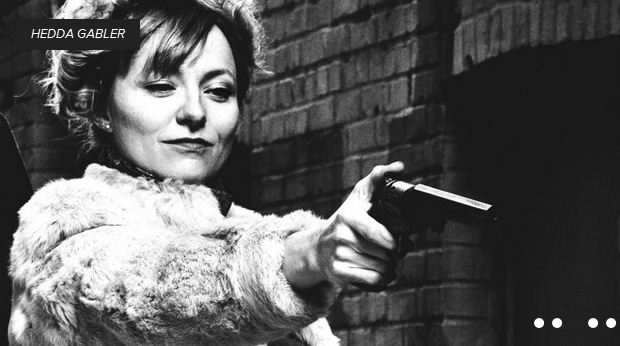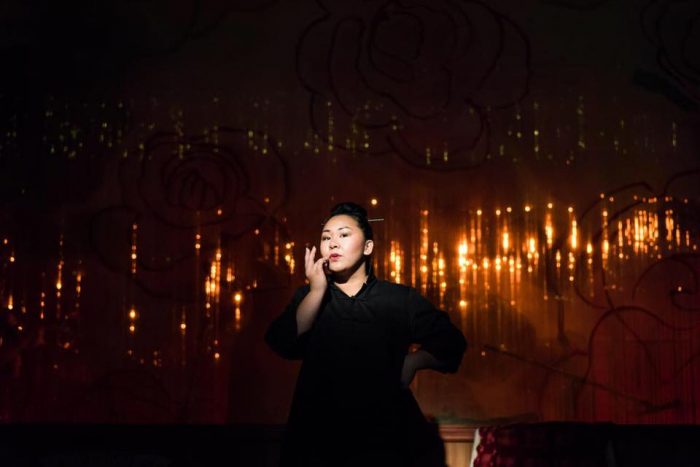Review: “Hedda Gabler” by Henrik Ibsen. Directed by Andrew Russell. With Marya Sea Kaminski, Ryan Fields, Timothy McCuen Piggee, Michael Place, Shellie Shulkin, Fawn Ledesma and Hannah Victoria Franklin. Now through August 25, 2012 at Intiman.
I think most critics generally try to avoid listening to or reading other opinions of productions they are reviewing prior to the actual writing of a review for obvious reasons. Obviously, I don’t want to compromise my opinions and reaction to a show by letting other people’s opinions influence my own. Of course, that’s easier said than done in the digital age…the Intiman Festival’s production of Ibsen’s “Hedda Gabler” began previews nearly two weeks ago and a few opinions of the show began appearing on Facebook prior to its official opening night and my own attendance a couple of days later. And, the buzz I was seeing was rather mixed with some elements of the show being praised…and others panned. It was enough to make me uneasy about actually seeing the show, which was one I was looking forward to experiencing. It put me on edge.
But, maybe that’s the best way to engage “Hedda Gabler”…it is, after all, about a woman teetering on the edge of a precipice as she not entirely self-destructs in the final 48 hours of her life. (And, anyone crying out “Spoiler” for a 100+ year play is banished for life from Seattle Theater Land….) Ibsen’s 1890 domestic drama focuses on the turmoil caused by the recently married Hedda to the rather dweebish academic Jorgen. Hedda married Jorgen on the rebound from the far more passionate and interesting Lovborg but Lovborg was on the verge of social ostracism due to his wild living; Jorgen was the safe bet. But Jorgen is dull and not very ambitious and Lovborg has since reformed and become successful with great prospects. Hedda’s unhappiness and bitter spite cause her to become involved in the affairs of her husband, Lovborg, their friends and family which ultimately lead to a tragic fate for several of the characters. It’s a dark play that can teeter into melodrama if not done correctly but it’s also an old play and one that can seem dry and uninviting to modern audiences.
Obviously, to capture contemporary audiences, that must be avoided. Intiman’s production makes a big point of emphasizing that this is a refreshed telling of Hedda’s story complete with a careful edit of the script, a vaguely defined setting, (the clothing is indeterminate mid to late 20th Century/modern), and a contemporary and more relaxed acting style and manner of speaking. It quickly becomes apparent that this isn’t your grandmama’s typical stiff/late Victorian production when Hedda, played by Marya Sea Kaminski, subtly at first but with more abandon as the play progresses, begins a series of spastic dance movements that include involuntary hand movements, back arching and a balletic twisting of her body whenever she becomes upset or uncomfortable or pressured by her life. These moments, created by noted choreographer Olivier Wevers in collaboration with Ms Kaminsky and director Andrew Russell are obviously not indicated in Ibsen’s script but a fascinating artistic choice on the part of the “Hedda” team. These movements reach their transcendence in the final moments of the play as Hedda’s movements involve into a lengthy final “dance of death” that culminates in the sound of the gun shot that ends her life. It’s a beautiful ballet of her own destruction and while I think the final dance goes on a good thirty seconds longer than necessary, it was still a fascinating and artistically compelling way to present the material by this production’s creators. Obviously these bold kinds of choices aren’t going to resonate with all members of the audience but for me, Intiman’s “Hedda Gabler” is a vital, stimulating and fresh approach to classic material with boldly inspired and assured direction by Mr. Russell and a passionate but pragmatic performance from Ms Kaminsky and all framed by gorgeous design work from the Intiman team. It’s a beautiful and challenging production and one of the jewels of Intiman’s summer festival.
Purists might not like it however due to the artistic liberties taken with the text. Two very intelligent women I know had issues with the modern approach to the costuming; they didn’t like the fact that the contemporary look of the clothing was detracting from a central theme of the play, that Hedda was a victim of the play’s setting and time…that she was perhaps enslaved by the corsets she had to wear as a woman of the late 19th century. One of my friends commented that this modern take on the material just made Hedda seem like a “vicious vindictive bitch!” I feel the exact opposite…the more contemporary approach only illustrates that women can still be oppressed and held back by societal demands and pressures…it might not be so apparent and pervasive as it was in 1890 but women still bump into a glass ceiling in many areas of contemporary life. This approach didn’t make Hedda any less sympathetic as a character or as a woman; it just made her more human. And, frankly, I don’t think Hedda is supposed to be a victim, or seen as “oh that poor creature was so awful because she was so unhappy living in such an oppressed time!” Hedda truly IS an awful person! If she’d lived in a more modern time, she would have just had the power to inflict her intellect and cruelty on a wider ranger of people. She’d have made a terrific project manager at Microsoft.
Andrew Russell’s fresh take on the material and assured staging keep this production briskly moving along. He’s also not afraid to use the entire depth of the Intiman stage and Jennifer Zeyl’s glorious set to stage peripheral but interesting moments. A series of sheer drapes divide the intimate main staging area from other rooms in the Gabler/Tesman home with moments played both behind as well as in front of the drapery. Mr. Russell is obviously also very attuned to shadow imagery; he used it in his production of “The Callers” at WET earlier this year and he uses it extensively here and very deliberately to portray hidden emotions and motives of the characters. At times, the entire production feels cinematic as well as theatrical. Henrik Ibsen was Norwegian but the mise en scene for this Hedda more recalls the work of the Swedish filmmaker/theater director Ingmar Bergman; there’s a strong, cold but passionate feeling to the pictures and sounds and effects being created on this stage and much of that can be attributed to the excellent designs by Ms Zeyl and Matt Starritt (Sound) and L.B. Morse (Lighting). And despite some naysayers, I really loved the beautiful and evocative costumes of Eric Andor that added great richness and texture to the characters and their inner lives.
Marya Sea Kaminski is terrific as Hedda; it’s not a sympathetic performance but it’s also not a harsh one. Her Hedda is blunt and to the point and not coy but Hedda shouldn’t be played as an innocent destroyed by the rigors of Victorian life. She is trapped but part of Hedda’s enslavement is her own doing; her fate can’t be entirely blamed on a patriarchal system. Ms Kaminski makes deliberate choices in her performance but those choices are nuanced and retain a sense of delicacy even when the actions of Hedda are hard and uncompromising. Hedda is terrified and sometimes terrifying and all those conflicting emotions are carefully entwined in this performance.
She’s well matched by by the men in her life with strong work from Ryan Fields as her dull husband Jorgen and Michael Place as the far more passionate former lover Lovborg who’s Hedda’s first and most emotionally enslaved victim. Timothy McCuen Piggee also adds to his Intiman Festival luster with another powerful performance as the sly neighborhood power broker Judge Brack. It’s a performance that lures you in and charms you before you ultimately realize that the Judge is not a nice man but a morally corrupt one who ultimately ends up with significant responsibility for Hedda’s fate. It’s both a charming and a chilling performance.
I also very much enjoyed Shellie Shulkin as the conniving and highly theatrical aunt who dotes quite strongly on her nephew Jorgen. The performance is a rich one that almost teeters over into being over ripe but Ms Shulkin manages to keep the character passionate and engaging without going over the line. She’s a little breath of Auntie Mame in that dour Scandinavian landscape.
Hannah Victoria Franklin is fine as the maid Berte but it’s rather odd casting. And, for anyone who’s seen this actress perform in other roles on other stages, it’s also quite apparent that SHE needs to eventually play Hedda Gabler; it’s obviously a role destined for her talents. As for Fawn Ledesma as the high strung neighbor Thea, her performance is plagued with far too many nervous tics and mannerisms to be believable or interesting. It’s the weakest performance in the production and it might have been wise for Ms Franklin and Ms Ledesma to switch roles. In an otherwise excellent production, the odd casting does stick out.
Intiman’s ‘Hedda Gabler” is fascinating and challenging theater with an interesting take on a classic work. Hard core traditionalists might not take to this “refreshing” of classic material, but this shadowy, Bergman-esque dance of death is must see theater. And, to draw us around full circle, the morale of the story I started in the first paragraph seems to be, don’t pay attention to random natterings on Facebook…judge for yourself.


















